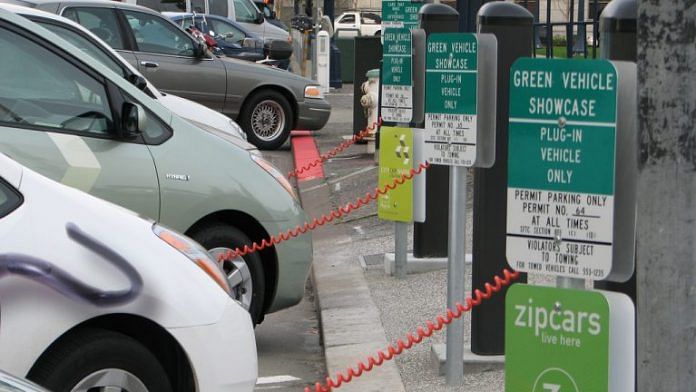New Delhi: In another effort to encourage people to switch to electrical vehicles, the Ministry of Road, Transport and Highways has issued a draft notification that exempts people from paying for issuing or renewing registration certificates if they have a battery-operated vehicle.
A registration certificate or RC is an official document, which states that one’s vehicle is registered with the Indian Government. A vehicle is only allowed to be used on Indian roads if it has a valid RC that mentions the territorial boundary in which the vehicle can be used, the category of the vehicle, fuel used, among other things.
It is valid for 15 years from the date of issuance and after expiry can be renewed for five years.
Issued on 27 May, the road ministry notification also proposes an exemption on the payment of a registration mark — which is used to identify vehicles and registered owners through license plates — in battery-operated vehicles.
Under the Central Motor Vehicles Rule 1989, a registration mark in vehicles needs to be displayed both at the front and rear of all motor vehicles clearly and legibly.
According to a senior official in the ministry, “This has been notified to encourage e-mobility.”
The ministry has now sought comments on the notification by the public, who have to respond to it within 30 days.
Also read: These are the markets of tomorrow — hyperloops, edtech, e-vehicles and reskilling
Modi govt’s e-vehicle project
The Narendra Modi government has come up with various proposals over the years to encourage the purchase of e-vehicles.
In the 2019 Budget, Finance Minister Nirmala Sitharaman had announced income tax exemption of upto Rs 1.5 lakh for people who would buy e-vehicles on a loan. The central government also brought down GST rates from 12 to 5 per cent in 2019.
Through the FAME (Faster Adoption and Manufacturing of (Hybrid &) Electric Vehicles) scheme, the government allocated Rs 10,000 crores in 2019 for a period of three years for e-vehicles.
Meanwhile, in the same year, NITI Aayog drafted a proposal to ban the sale of non-electric three-wheelers and motorcycles by 2023 and 2025 respectively. However, due to the economic slowdown in 2019, Road Transport & Highways Minister Nitin Gadkari confirmed that the government was not setting a specific timeline for the switch to e-vehicles, and would let market forces determine the speed of the transition.
According to a survey conducted by CarWale, an online automobile classifieds firm, in February 2021, over 70,000 people in metros and non-metros said they wanted an electric vehicle as their next car. However, they cited lack of infrastructure such as charging stations as the main reason for not buying them.
Also read: How commercial vehicles are leading India’s electric vehicle revolution



